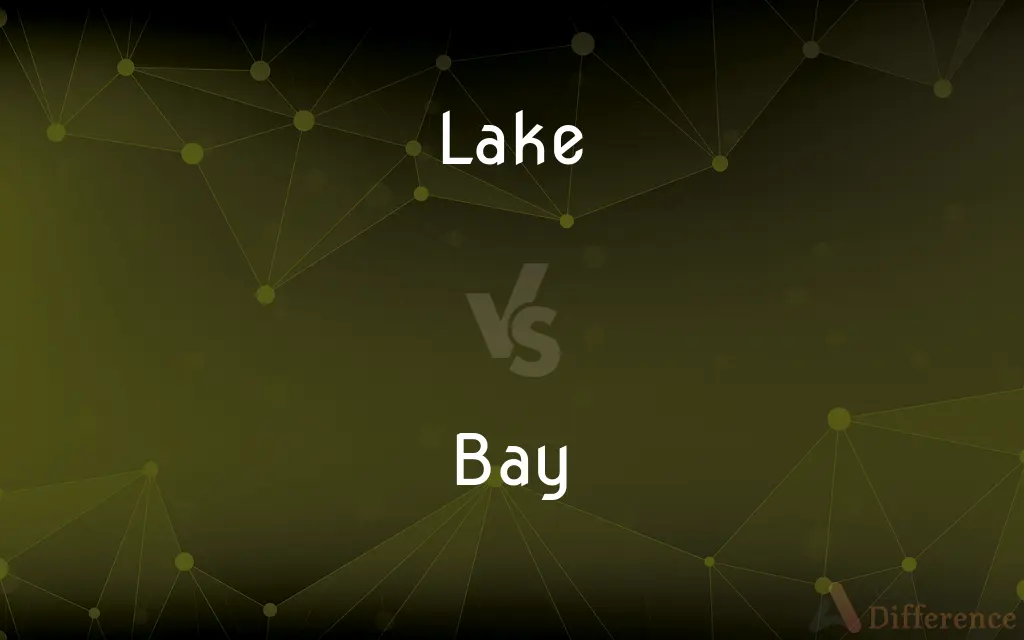Lake vs. Bay — What's the Difference?
By Tayyaba Rehman & Maham Liaqat — Updated on March 19, 2024
A lake is a large body of water surrounded by land, used for activities like fishing and boating, while a bay is a body of water partially enclosed by land, often serving as a safe harbor for ships.

Difference Between Lake and Bay
Table of Contents
ADVERTISEMENT
Key Differences
A lake is an inland body of freshwater or saltwater, typically larger and deeper than a pond, surrounded by land. On the other hand, a bay is a body of water that is partially enclosed by land but has a wider mouth, connecting it to the ocean or a larger sea.
While lakes are predominantly freshwater, with notable exceptions like the Great Salt Lake, they are critical for freshwater ecosystems, supporting a wide range of flora and fauna. Lakes also serve as important water sources for irrigation, drinking, and industrial purposes. Conversely, bays can be either saltwater or brackish and are crucial for coastal ecosystems. They serve as nurseries for many marine species, protect coastlines from erosion, and support fishing and aquaculture industries.
Lakes are often used for recreational activities such as fishing, boating, and swimming, attracting tourists and contributing to the local economy. Their isolated waters can also be used for hydroelectric power generation. In contrast, bays, with their connection to the sea, are vital for commercial shipping and trade. They often host ports and have historically been sites for major cities and civilizations due to their strategic and economic importance.
In terms of geography, lakes can occur at various elevations, from high mountain lakes to those at sea level. Their sizes and depths can vary widely, from small ponds to vast freshwater bodies like the Great Lakes. Bays, however, are typically part of a sea or ocean, and their size can be influenced by the shoreline's geography and the ocean's dynamics.
Finally, the conservation of lakes focuses on maintaining freshwater quality, managing invasive species, and preserving surrounding habitats. Bay conservation efforts, however, emphasize protecting marine biodiversity, combating pollution, and mitigating the impacts of coastal development and climate change. Both require specific strategies to address their unique environmental challenges.
ADVERTISEMENT
Comparison Chart
Definition
A large body of water surrounded by land, not part of an ocean.
A body of water partially enclosed by land, connecting to a larger sea or ocean.
Water Type
Primarily freshwater, but can be saltwater.
Saltwater or brackish.
Formation
Glaciation, tectonic activity, volcanic activity.
Erosion, tectonic activity, drowning of river valleys.
Primary Uses
Freshwater supply, recreation, biodiversity habitat.
Shipping, trade, marine habitat, recreational activities.
Conservation Focus
Freshwater quality, invasive species management, habitat preservation.
Marine biodiversity, pollution control, impact of coastal development.
Compare with Definitions
Lake
Formed by glaciers, volcanic craters, or tectonic plate movements.
Crater Lake was formed by the collapse of a volcano.
Bay
Faces environmental issues like pollution and habitat destruction.
The Bay of Bengal is affected by pollution from river runoff.
Lake
Subject to environmental concerns like pollution and invasive species.
Lake Erie faces challenges from agricultural runoff and invasive zebra mussels.
Bay
A body of water partially enclosed by land, larger than a cove but smaller than a gulf.
San Francisco Bay is known for its iconic Golden Gate Bridge.
Lake
A large body of water surrounded by land.
Lake Superior, one of the Great Lakes, is the largest freshwater lake by surface area.
Bay
Can be formed by sea level rise or land sinking.
Chesapeake Bay is the result of a meteor impact and subsequent flooding.
Lake
Habitats for freshwater ecosystems.
Lake Victoria supports diverse species, including unique cichlid fish.
Bay
Often serves as a safe harbor and site for ports.
Tokyo Bay has one of the busiest ports in the world.
Lake
Used for water supply, recreation, and sometimes hydroelectric power.
Lake Tahoe is a popular recreational site for boating and fishing.
Bay
Supports marine ecosystems and nurseries for fish.
Monterey Bay is renowned for its diverse marine life, including kelp forests.
Lake
A lake is an area filled with water, localized in a basin, surrounded by land, apart from any river or other outlet that serves to feed or drain the lake. Lakes lie on land and are not part of the ocean, although like the much larger oceans, they form part of Earth's water cycle.
Bay
A bay is a recessed, coastal body of water that directly connects to a larger main body of water, such as an ocean, a lake, or even another bay. A large bay is usually called a gulf, sea, sound, or bight.
Lake
A large area of water surrounded by land
Lake Victoria
Boys were swimming in the lake
Bay
A body of water partially enclosed by land but with a wide mouth, affording access to the sea
The Bay of Biscay.
Lake
An insoluble pigment made by combining a soluble organic dye and an insoluble mordant.
Bay
An area of land, such as an arm of prairie partially enclosed by woodland, that resembles in shape or formation a partially enclosed body of water.
Lake
A large inland body of fresh water or salt water.
Bay
(Architecture) A part of a building marked off by vertical elements, such as columns or pilasters
An arcade divided into ten bays.
Lake
A scenic pond, as in a park.
Bay
A bay window.
Lake
A large pool of liquid
A lake of spilled coffee on my desk.
Bay
An opening or recess in a wall.
Lake
A pigment consisting of organic coloring matter with an inorganic, usually metallic base or carrier, used in dyes, inks, and paints.
Bay
A section or compartment, as in a service station, barn, or aircraft, that is set off for a specific purpose
A cargo bay.
An engine bay.
Lake
A deep red.
Bay
A sickbay.
Lake
A large, landlocked stretch of water or similar liquid.
Bay
(Computers) A drive bay.
Lake
A large amount of liquid; as, a wine lake.
Bay
A reddish brown.
Lake
A small stream of running water; a channel for water; a drain.
Bay
A reddish-brown animal, especially a horse having a black mane and tail.
Lake
(obsolete) A pit, or ditch.
Bay
A deep, prolonged bark, such as the sound made by hounds.
Lake
(obsolete) An offering, sacrifice, gift.
Bay
The position of one cornered by pursuers and forced to turn and fight at close quarters
The hunters brought their quarry to bay.
Lake
(dialectal) Play; sport; game; fun; glee.
Bay
The position of having been checked or held at a distance
"He has seen the nuclear threat held at bay for 40 years" (Earl W. Foell).
Lake
(obsolete) A kind of fine, white linen.
Bay
See laurel.
Lake
In dyeing and painting, an often fugitive crimson or vermillion pigment derived from an organic colorant (cochineal or madder, for example) and an inorganic, generally metallic mordant.
Bay
Any of certain other trees or shrubs with aromatic foliage, such as the California laurel.
Lake
In the composition of colors for use in products intended for human consumption, made by extending on a substratum of alumina, a salt prepared from one of the certified water-soluble straight colors.
The name of a lake prepared by extending the aluminum salt prepared from FD&C Blue No. 1 upon the substratum would be FD&C Blue No. 1--Aluminum Lake.
Bay
A crown or wreath made especially of the leaves and branches of the laurel and given as a sign of honor or victory.
Lake
(obsolete) To present an offering.
Bay
Often bays Honor; renown.
Lake
To leap, jump, exert oneself, play.
Bay
Reddish-brown
A bay colt.
Lake
To make lake-red.
Bay
To utter a deep, prolonged bark.
Lake
A pigment formed by combining some coloring matter, usually by precipitation, with a metallic oxide or earth, esp. with aluminium hydrate; as, madder lake; Florentine lake; yellow lake, etc.
Bay
To pursue or challenge with barking
"I had rather be a dog, and bay the moon" (Shakespeare).
Lake
A kind of fine white linen, formerly in use.
Bay
To express by barking or howling
A mob baying its fury.
Lake
A large body of water contained in a depression of the earth's surface, and supplied from the drainage of a more or less extended area.
Bay
To bring to bay
"too big for the dogs which tried to bay it" (William Faulkner).
Lake
To play; to sport.
Bay
(obsolete) A berry.
Lake
A body of (usually fresh) water surrounded by land
Bay
, a tree or shrub of the family Lauraceae, having dark green leaves and berries.
Lake
A purplish red pigment prepared from lac or cochineal
Bay
Bay leaf, the leaf of this or certain other species of tree or shrub, used as a herb.
Lake
Any of numerous bright translucent organic pigments
Bay
The leaves of this shrub, woven into a garland used to reward a champion or victor; hence, fame, victory.
Bay
A tract covered with bay trees.
Bay
A kind of mahogany obtained from Campeche in Mexico.
Bay
(geography) A body of water (especially the sea) more-or-less three-quarters surrounded by land.
Bay
A bank or dam to keep back water.
Bay
An opening in a wall, especially between two columns.
Bay
An internal recess; a compartment or area surrounded on three sides.
Bay
The distance between two supports in a vault or building with a pitched roof.
Bay
(nautical) Each of the spaces, port and starboard, between decks, forward of the bitts, in sailing warships.
Bay
(rail transport) A bay platform.
Bay
A bay window.
Bay
The excited howling of dogs when hunting or being attacked.
Bay
(by extension) The climactic confrontation between hunting-dogs and their prey.
Bay
(figuratively) A state of being obliged to face an antagonist or a difficulty, when escape has become impossible.
Bay
A brown colour/color of the coat of some horses.
Bay
A horse of this color.
Bay
(intransitive) To howl.
Bay
(transitive) To bark at; hence, to follow with barking; to bring or drive to bay.
To bay the bear
Bay
(transitive) To pursue noisily, like a pack of hounds.
Bay
Of a reddish-brown colour (especially of horses).
Bay
Reddish brown; of the color of a chestnut; - applied to the color of horses.
Bay
An inlet of the sea, usually smaller than a gulf, but of the same general character.
Bay
A small body of water set off from the main body; as a compartment containing water for a wheel; the portion of a canal just outside of the gates of a lock, etc.
Bay
A recess or indentation shaped like a bay.
Bay
A principal compartment of the walls, roof, or other part of a building, or of the whole building, as marked off by the buttresses, vaulting, mullions of a window, etc.; one of the main divisions of any structure, as the part of a bridge between two piers.
Bay
A compartment in a barn, for depositing hay, or grain in the stalks.
Bay
A kind of mahogany obtained from Campeachy Bay.
Bay
A berry, particularly of the laurel.
Bay
The laurel tree (Laurus nobilis). Hence, in the plural, an honorary garland or crown bestowed as a prize for victory or excellence, anciently made or consisting of branches of the laurel.
The patriot's honors and the poet's bays.
Bay
A tract covered with bay trees.
Bay
Deep-toned, prolonged barking.
Bay
A state of being obliged to face an antagonist or a difficulty, when escape has become impossible.
Embolden'd by despair, he stood at bay.
The most terrible evils are just kept at bay by incessant efforts.
Bay
A bank or dam to keep back water.
Bay
To bark, as a dog with a deep voice does, at his game.
The hounds at nearer distance hoarsely bayed.
Bay
To bark at; hence, to follow with barking; to bring or drive to bay; as, to bay the bear.
Bay
To bathe.
Bay
To dam, as water; - with up or back.
Bay
An indentation of a shoreline larger than a cove but smaller than a gulf
Bay
The sound of a hound on the scent
Bay
Small Mediterranean evergreen tree with small blackish berries and glossy aromatic leaves used for flavoring in cooking; also used by ancient Greeks to crown victors
Bay
A compartment on a ship between decks; often used as a hospital;
They put him in the sick bay
Bay
A compartment in an aircraft used for some specific purpose;
He opened the bomb bay
Bay
A small recess opening off a larger room
Bay
A horse of a moderate reddish-brown color
Bay
Utter in deep prolonged tones
Bay
Bark with prolonged noises, of dogs
Bay
(used of animals especially a horse) of a moderate reddish-brown color
Common Curiosities
What is the main difference between a lake and a bay?
A lake is a large body of water surrounded by land, whereas a bay is a body of water partially enclosed by land but connected to a larger sea or ocean.
What kind of activities can you do in a lake?
Activities include fishing, boating, swimming, and other recreational activities.
How are bays formed?
Bays can be formed by erosion, tectonic movements, or the drowning of river valleys.
Why are bays important for shipping?
Bays provide natural harbors and shelter for ships, making them crucial for commercial shipping and trade.
Are all bays saltwater?
Most bays are saltwater, but some can be brackish, depending on freshwater inflows.
How do bays contribute to marine biodiversity?
Bays serve as nurseries for many marine species and support diverse marine ecosystems.
Can lakes have natural outlets to the sea?
Some lakes have natural outlets to the sea, but these are rare and often classified differently.
Why are bays ideal locations for ports?
Their sheltered waters provide safe harbors for docking and loading ships, making them ideal for ports.
What role do bays play in coastal erosion?
Bays can help protect coastlines from direct wave action, reducing erosion.
What is a significant environmental concern for lakes?
Pollution, especially from agricultural runoff, and invasive species are significant concerns.
Can lakes be saltwater?
Yes, there are saltwater lakes, such as the Great Salt Lake in Utah, USA.
How does urban development affect bays?
Urban development can lead to pollution, habitat destruction, and increased sedimentation in bays.
Is fishing allowed in all lakes?
Fishing regulations vary by lake, with some requiring licenses or having specific restrictions to protect ecosystems.
How are lakes and bays similar?
Both are bodies of water that play important roles in their respective ecosystems and human activities.
What measures are taken for lake conservation?
Efforts include monitoring water quality, managing fish populations, and controlling invasive species.
Share Your Discovery

Previous Comparison
Diagnosis vs. Analysis
Next Comparison
Prologue vs. PreludeAuthor Spotlight
Written by
Tayyaba RehmanTayyaba Rehman is a distinguished writer, currently serving as a primary contributor to askdifference.com. As a researcher in semantics and etymology, Tayyaba's passion for the complexity of languages and their distinctions has found a perfect home on the platform. Tayyaba delves into the intricacies of language, distinguishing between commonly confused words and phrases, thereby providing clarity for readers worldwide.
Co-written by
Maham Liaqat













































